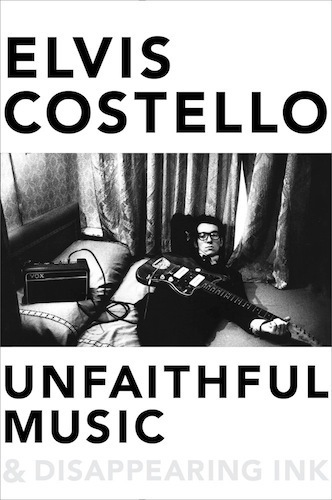
10.19.2015
ELVIS COSTELLO’S ‘UNFAITHFUL MUSIC & DISAPPEARING INK’ IS TOO CLEVER FOR ITS OWN GOOD
Billboard: Andy Lewis: October 16th 2015
Publisher Blue Rider Press touts Elvis Costello’s Unfaithful Music & Disappearing Ink as on par with Patti Smith’s Just Kids and Keith Richards’ Life, widely considered (along with Bob Dylan’s Chronicles) as the best rock memoirs. The brainy Costello — known for inventive albums (Armed Forces, Imperial Bedroom), eclectic collaborations (Kid Rock to Ruben Blades) and deep-cut knowledge of music history — invites such comparisons.
Unfaithful Music doesn’t live up to those expectations, though there are flashes of brilliance. Costello has an eye for capturing a person with one quick observation: Bruce Springsteen “laughed like steam escaping from a radiator”; lover Bebe Buell shows up on his doorstep “gift-wrapped [like] a mail-order bride” who “meant to do me harm”; David Bowie has a secret talent for party games. The parts about the making of his music are great, thoroughly dissecting his lyrics and influences (Jimi Hendrix’s “The Wind Cries Mary” was in his head when he wrote “Alison”). He writes movingly of his conflicted relationship with his father, a musician and philanderer; indeed, the dominant thread here is Costello’s attempts to come to terms with their relationship.
It’s a pity he doesn’t bring the same depth and self-awareness to his other relationships. Buell gets barely a paragraph. His 16-year marriage to Pogues bassist Cait O’Riordan comes and goes in a blink, recounted in an impressionistic fashion that substitutes poetic turns of phrase for actual details. (Readers may find themselves repeatedly reaching for Google to clarify things.) Other well-known events — most notably, the infamous performance that got him banned from Saturday Night Live in 1977, and an out-of-character drunken, racist rant in 1979 — read more like dreams than real stories. Add to that neck-snapping time jumps — the book goes from the ’70s to the ’20s and back to the present in just a few short chapters — that are so erratic they practically induce vertigo. The whole thing is just a little too clever for its own good. As Costello sang on his 1977 debut, My Aim Is True, “Imagination is a powerful deceiver.”